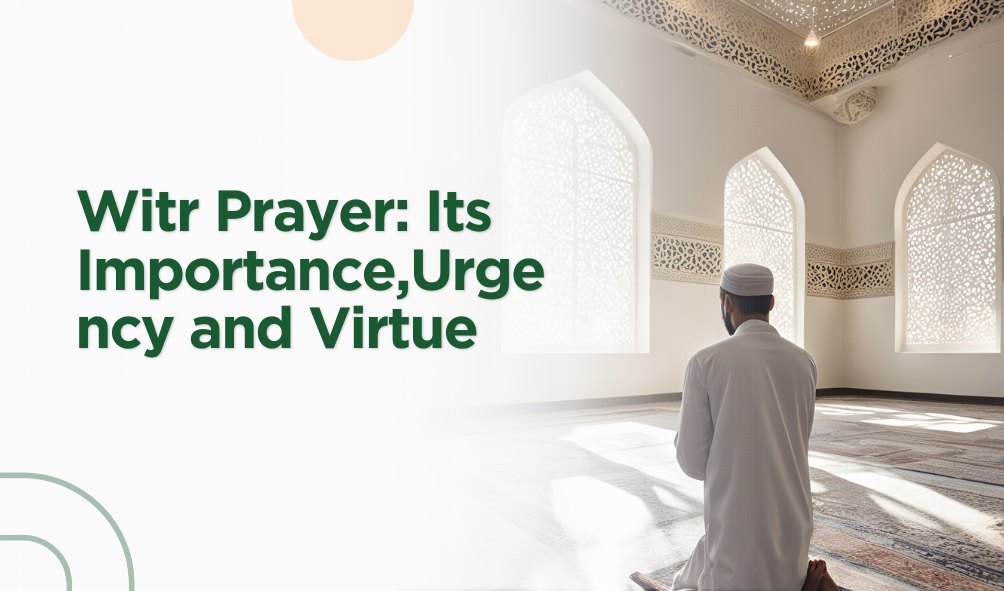Witr Prayer: Its Importance,Urgency and Virtue
The Witr prayer is a highly recommended sunnah prayer in Islam, performed as the closing prayer of the night, particularly after Isha. Although it is not obligatory, Witr holds significant value in strengthening a Muslim’s worship. The Prophet Muhammad (peace be upon him) consistently performed Witr, whether traveling or at home. Therefore, understanding the urgency and virtues of Witr enriches our practice.
The Urgency of Witr Prayer
Witr is classified as a sunnah muakkadah (highly emphasized voluntary prayer), with some scholars considering it near obligatory. The Prophet Muhammad (peace be upon him) said:
“إِنَّ اللَّهَ وِتْرٌ يُحِبُّ الْوِتْرَ، فَأَوْتِرُوا يَا أَهْلَ الْقُرْآنِ”
“Indeed, Allah is odd and loves odd numbers, so perform the Witr, O people of the Qur’an”
(Hadith Tirmidhi No. 453).
The Witr prayer is viewed as the final prayer that seals all other night prayers. In some Islamic schools of thought, such as Hanafi, Witr is considered almost obligatory due to its importance.
Additionally, Witr is an opportunity to offer final supplications and seek forgiveness from Allah Subhanahu wa Ta’ala before ending the day. Hence, this prayer holds a special place in the hearts of Muslims who wish to strengthen their relationship with their Lord before concluding their day.
Also read:It’s Never Too Late to Learn Islamic Knowledge
The Virtues of Witr Prayer
- Ending the Night with Supplication
One of the key virtues of Witr is that it concludes the night with worship and supplication. In Witr, the Qunut prayer is recited during the last rak’ah, where a Muslim seeks forgiveness, protection, and guidance from Allah Subhanahu wa Ta’ala. This makes Witr a powerful moment to reflect, seek pardon for sins, and end the night in peace.
- Great Reward
Although Witr is a sunnah prayer, its reward is significant. The Prophet Muhammad (peace be upon him) promised immense rewards for those who perform it consistently. Regularly observing Witr enhances one’s closeness to Allah, and shows diligence in worship, which results in great spiritual benefits.
- Calmness for the Soul and Mind
In addition to spiritual rewards, Witr also offers mental and emotional benefits. Praying Witr, particularly in the stillness of the night, provides tranquility. This peacefulness calms the mind, alleviates anxiety, and improves sleep quality, making Witr an effective spiritual remedy for life’s challenges.
- A Time for Answered Prayers
Another significant virtue of Witr is its timing, which falls during moments when supplications are answered, especially when performed late in the night before dawn. According to a hadith, Allah Subhanahu wa Ta’ala descends to the lowest heaven during the last third of the night and answers the prayers of those who call upon Him. Hence, Witr offers an optimal time to present personal prayers and seek Allah’s favor.
How to Perform Witr Prayer
Witr is performed with an odd number of rak’ahs, usually one, three, five, seven, or nine. The most common form is praying three rak’ahs. The procedure may vary depending on Islamic schools of thought, but generally, Witr is offered by first praying two rak’ahs followed by the final rak’ah.
In the last rak’ah, after bowing (ruku’), the Qunut supplication is recited. Some schools of thought permit the Qunut to be recited before the ruku’. The Qunut includes supplications for forgiveness, guidance, and protection, making it an essential part of Witr that further enriches its significance.
Also read:Prophet Muhammad ﷺ as a Role Model of Character Education
The Time for Witr Prayer
Witr is performed after the Isha prayer and before Fajr (dawn). Although it can be offered anytime after Isha, the most virtuous time is in the last third of the night. Prophet Muhammad (peace be upon him) strongly recommended performing Witr at this time due to the heightened chances of supplications being answered.
However, for those who fear they may not wake up for the last third of the night, Witr may be prayed immediately after Isha. The Prophet (peace be upon him) was known to sometimes pray Witr at different times—early night, middle night, and last night—depending on the situation.
Conclusion
The Witr prayer is a sunnah act of worship that carries immense virtues in Islam. Although it is not obligatory, it is highly recommended to close the night with this prayer. Its virtues range from strengthening one’s connection to Allah Subhanahu wa Ta’ala, to bringing mental peace and tranquility. Therefore, Witr should not be neglected by those who wish to enhance their spiritual practice and improve their relationship with Allah.
Also read:The Legacy of Khadeejah: Sacrificing Wealth for the Prophet ﷺ

References
- Prayerislam.com. (2024). Benefits of Witr Prayer. Retrieved from https://prayerislam.com/benefits-witr-prayer/
- Lessonislam.org. (2024). The Powerful Benefits of Witr Prayer. Retrieved from https://lessonislam.org/benefits-of-witr-prayer/
- NU.or.id. (2020). Tata Cara Shalat Witir: Niat, Waktu, Bacaan, dan Keutamaannya. Retrieved from https://islam.nu.or.id/shalat/tata-cara-shalat-witir-niat-waktu-bacaan-dan-keutamaannya-elGSZ
- Muslimah.or.id. (2008). Shalat Witir. Retrieved from https://muslimah.or.id/1059-shalat-witir.html
- Rumaysho.com. (2020). Shalat Sunnah Witir. Retrieved from https://rumaysho.com/19224-shalat-sunnah-witir-01.html
- Hadithprophet.com. (n.d.). Hadith 58693: Allah loves odd numbers and so you should pray Witr. Retrieved from https://hadithprophet.com/hadith-58693.html





